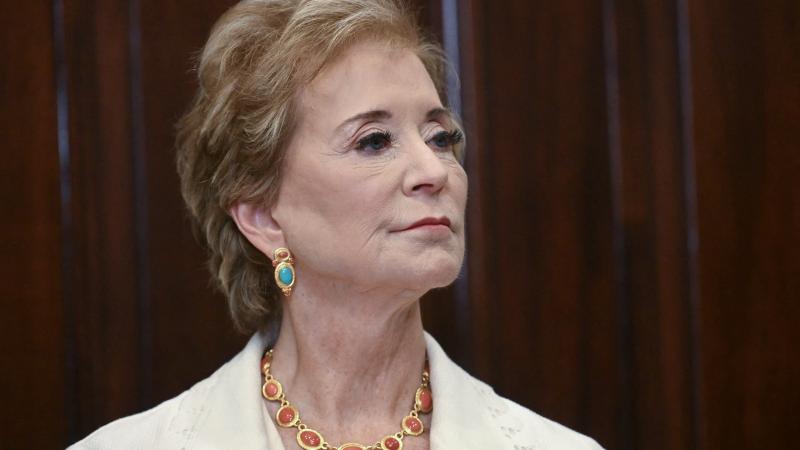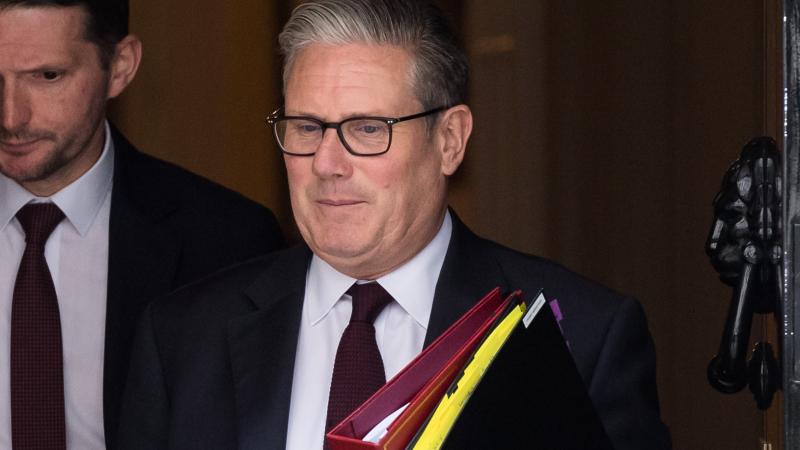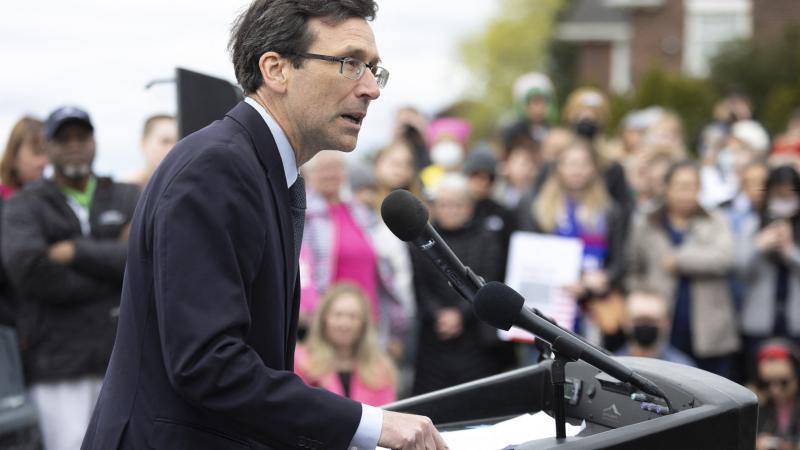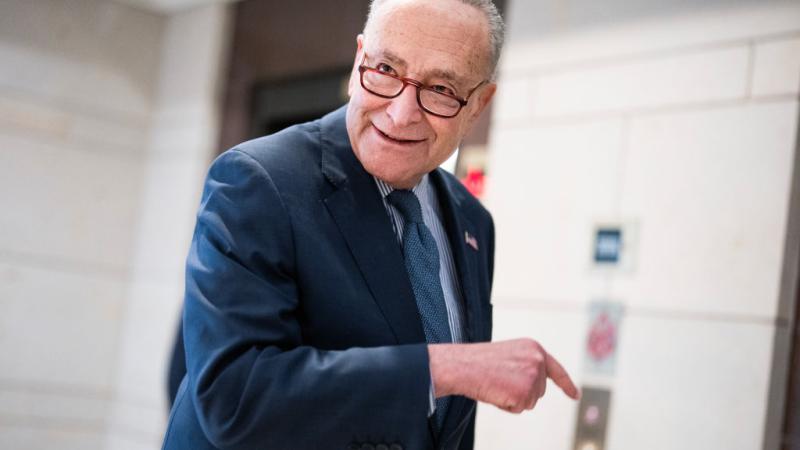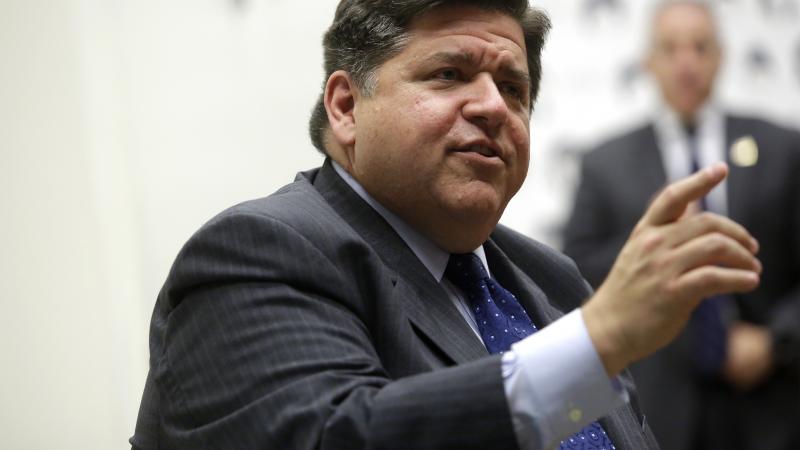Trump vows to end secrecy of foreign & CCP funding on campus after Biden ‘turned a blind eye’
The first Trump Administration was serious about the challenge posed by foreign funding and CCP influence at American colleges.
President Donald Trump has vowed to “end the secrecy” surrounding foreign funding and Chinese Communist Party (CCP) influence at U.S. colleges and universities after the Biden administration “turned a blind eye” to the problem.
Trump said in a late April executive order that “it is the policy of my Administration to end the secrecy surrounding foreign funds in American educational institutions, protect the marketplace of ideas from propaganda sponsored by foreign governments, and safeguard America’s students and research from foreign exploitation.”
The president ordered Education Secretary Linda McMahon and Attorney General Pam Bondi to enforce the federal laws surrounding the disclosure of foreign funding on U.S. campuses after Biden Education Secretary Miguel Cardona deprioritized the issue over the previous four years.
“During my first term, the Department of Education opened investigations on nineteen campuses from 2019-2021, which led universities to report $6.5 billion in previously undisclosed foreign funds,” Trump said in the April executive order. “Yet the prior administration undid this work, moving the Department of Education’s specialized investigatory work on foreign funds to a unit ill-equipped to perform it, undermining investigations, and hindering public access to information on foreign gifts and contracts.”
Holding higher education accountable for violating law
U.S. institutions of higher education are required to disclose publicly any foreign donations exceeding $250,000. The law, Section 117 of the Higher Education Act, went largely unenforced for decades before efforts by the Education Department under the Trump administration forced numerous institutions to amend their disclosures. The law then went largely unenforced again during Joe Biden’s presidency, with Trump’s executive order arguing that “because Section 117 has not been robustly enforced, the true amounts, sources, and purposes of foreign money flowing to American campuses are unknown.”
Trump said in his April 23 executive order that “the Secretary of Education and the Attorney General shall hold accountable higher education institutions that fail to comply with the law concerning disclosure of foreign funding.” The Trump White House “fact sheet” said McMahon will work with Bondi “and relevant departments and agencies to hold non-compliant institutions accountable through audits, investigations, and enforcement actions.”
Back to a marketplace of ideas instead of foreign propaganda
The fact sheet said the president had directed the secretary of education to “provide the American people with greater access to general information about foreign funding of higher education institutions, which the prior administration kept limited.” McMahon has now been told to “reverse or rescind any actions by the prior administration that allow universities to obscure details regarding their foreign funding” and to “require universities to disclose the true source and purpose of foreign funds.”
Since Trump’s executive order last month, the Education Department has already launched foreign funding investigations into Harvard University, the University of California at Berkeley (UC Berkeley), and the University of Pennsylvania (UPenn).
Education Secretary McMahon quickly declared in a press release on the day of Trump’s executive order that the president’s directive “will safeguard American interests on campus and protect students” and that her department “will ‘follow the money,’ put a stop to malign foreign infiltration, secure the research enterprises, and restore American campuses to marketplaces of ideas rather than hosts for foreign propaganda.”
“Colleges and universities have a legal duty to report foreign gifts and contracts and, in President Trump’s first term, the Department of Education held them to it. Unfortunately, in the last four years, the Biden Administration undermined the structures the President built to do this critical work, allowing nations like China and Qatar to funnel billions of dollars to U.S. universities with little to no oversight,” she said on April 23. “This financial infiltration enabled foreign governments to steal taxpayer-funded intellectual property and reshape how our elite campuses teach about Israel and the Middle East.”
The Biden Education Department had said in 2022 that it was transitioning primary responsibilities for rule enforcement away from the Office of General Counsel (OGC) to the Office of Federal Student Aid.
A GOP aide on the House Education Committee who declined to be named told Just the News that that move raised serious questions about the Biden Education Department's resource allocation and prioritization.
But McMahon reversed this Biden-era policy on April 25, directing her OGC to “re-assume” the “enforcement functions relating to the disclosures of foreign gifts and contracts under Section 117.” McMahon said that “by returning foreign funding disclosure oversight duties to OGC, the Trump Administration has made clear its prioritization of Section 117 enforcement.”
“The Biden-Harris Administration turned a blind eye to colleges and universities’ legal obligations by deprioritizing oversight and allowing foreign gifts to pour onto American campuses. Despite widespread compliance failures, no new Section 117 investigations were initiated for four years, and ongoing investigations were closed prematurely,” McMahon said in a press release late last month. “I have great confidence in my Office of General Counsel to investigate these matters fully.”
Sen. Jim Banks (R-Ind.) told Just the News that “the Biden administration lacked the courage to protect American education from foreign influence and, instead, left our academic institutions vulnerable to being compromised.”
“During his first term, President Trump was diligent about combating this threat. His administration understands the vulnerabilities we face — unlike Biden who ceded ground to Communist China by turning a blind eye to efforts to infiltrate American academia,” Banks said. “I believe the Trump administration will be just as effective this term. … We’re fighting a multi-front war against foreign influence at our universities and President Trump is on the path to victory.”
Harvard and other federally funded schools now in the hot seat
The Education Department announced an investigation into foreign funding at Harvard University on April 17.
“As a recipient of federal funding, Harvard University must be transparent about its relations with foreign sources and governments. Unfortunately, our review indicated that Harvard has not been fully transparent or complete in its disclosures, which is both unacceptable and unlawful,” McMahon said. “This records request is the Trump Administration’s first step to ensure Harvard is not being manipulated by, or doing the bidding of, foreign entities, which include actors who are hostile to the interests of the United States and American students. We hope Harvard will respect its own motto and be truthful in its federal filings and foreign relationships.”
The letter sent to Harvard said that “the Department’s review of Harvard’s most recent Section 117 disclosures (including within its amended disclosure reports for the period 2014-2019) reveals incomplete and inaccurate disclosures have once again been provided to the Department by Harvard (including non-compliant transaction disclosures and the submission of anonymous donors, among other deficiencies), in possible violation of the conditions of Harvard’s December 2024 Agreement with the Department.”
Harvard’s ties to CCP-linked groups have also come under scrutiny in recent weeks, including its purported ties to the CCP’s Xinjiang Production and Construction Corps (XPCC) — a paramilitary group which was sanctioned in 2020 by the U.S. government over its role in the repression of Uyghur Muslims in the Xinjiang Uyghur Autonomous Region (XUAR).
A report by Strategy Risks, a consulting firm run by China expert Isaac Stone Fish, alleged in April that “in October 2023, Harvard representatives trained members of the Xinjiang Production and Construction Corps.” A spokesperson for Harvard did not deny the collaboration, but said instead that the “goal with these trainings is straightforward … to build capacity for public officials across China to create effective insurance programs with sustainable financial models so that all people across China can get access to high-quality health care.”
It was also reported by the Washington Free Beacon last month that, in 2019, “Harvard’s T.H. Chan School of Public Health partnered with Beijing’s National Health Security Administration (NHSA) to launch an annual health financing course, training government staffers from across China” and that “Harvard originally noted in a blog post that officials with the Xinjiang Production and Construction Corps participated in the inaugural training.” The outlet also revealed that officials from the XPCC were also involved in trainings in 2024 too.
Harvard did not respond to a request for comment from Just the News.
The Department of Education (DOE) also announced an inquiry into the University of California at Berkeley on April 25, with the department revealing it had “initiated a Notice of Investigation and Records Request” into the school “after a review of the university’s foreign funding disclosures to the Department may be incomplete or inaccurate.”
"UC Berkeley is reviewing the Department of Education inquiry and will cooperate with all federal inquiries and investigations, as has long been our practice," Dan Mogulof, an assistant vice chancellor at the school, told Just the News.
The DOE also announced on Thursday that its Office of the General Counsel (OGC) had “opened a foreign funding investigation and sent a records request to the University of Pennsylvania (UPenn) after a review of the university’s foreign reports revealed inaccurate and incomplete disclosures.”
Secret foreign donors boost the Biden brand at UPenn
Just the News previously reported that UPenn had hosted Joe Biden’s “Penn Biden Center" and "received $47.7 million in gifts and contracts from Chinese sources while Biden worked as a guest lecturer” at the school.
Just the News also reported that UPenn played a role in convincing the Biden Justice Department to shut down the Trump-era DOJ’s China Initiative.
"The Committee has learned UPenn received millions of dollars from anonymous Chinese sources, with a marked uptick in donations when then-former Vice President Biden was announced as leading the Penn Biden Center initiative. Following the formation of the Penn Biden Center, donations originating from China tripled and continued while Joe Biden explored a potential run for President,” the GOP-led House Oversight Committee told UPenn in a 2023 letter demanding information about Chinese donations.
“The number of foreign donors whose identities remain undisclosed by UPenn is extremely large,” the DOE said in its Thursday letter to UPenn.
“For example, of the 692 disclosure reports submitted by UPenn between February 2019 and June 2020," the letter reads, "176 of them — valued at approximately $80 million — were reported as anonymous foreign sources by UPenn, although it is difficult to believe that UPenn had no idea who these significant donors are.
A footnote in the letter added that 39 of the foreign donations, valued at approximately $31 million, “were from Chinese sources.”
UPenn did not respond to Just the News' request for comment.
House has an even wider list of potential violations by U.S. universities
The House Select Committee on the CCP — led by Rep. John Moolenaar, R-Mich. — has also been investigating Chinese influence and funding on U.S. campuses this year.
The CCP Select Committee and the House Education Committees announced on February 20 that they were “calling on the leaders of Eastern Michigan University, Oakland University, and the University of Detroit Mercy to end their schools’ partnerships with Chinese universities.”
The GOP-led House committees said in a press release that “in these partnerships, the Michigan universities are directly interacting with Chinese institutions that support the Chinese military and its efforts to gain a technological advantage over the United States” and that “the universities’ partnerships also jeopardize the security of research that is funded by the American people through the Department of Defense, the National Science Foundation, and other agencies.”
The schools did not respond to requests for comment from Just the News.
Moolenaar sent a March 19 letter to the presidents of Carnegie Mellon (CMU), Purdue University, Stanford University, the University of Illinois, the University of Maryland, and the University of Southern California (USC) “requesting information on each of their policies and practices regarding the enrollment of Chinese national students in advanced STEM programs, questioning their involvement in federally funded research.”
The select committee chairman said that “America's student visa system has become a Trojan horse for Beijing, providing unrestricted access to our top research institutions and posing a direct threat to our national security.”
Cassia Crogan, a member of the CMU communications team, pointed Just the News to a lengthy March 26 statement by CMU President Farnam Jahanian.
"I do wish to acknowledge that CMU was one of six universities to receive a letter from the House Select Committee on the Chinese Communist Party. The letter asks for aggregated information about CMU’s international students, insights into our policies and practices related to the participation of these students in research, and information about collaborations among the university and China-based universities and research institutions," CMU's president said. "We are carefully reviewing the letter and will respond to it appropriately, consistent with how we generally respond to requests from the federal government."
Hafsa Siddiqi, manager of media relations at the University of Maryland, told Just the News, "It is our understanding that the request did not seek personally identifiable information. We responded accordingly, and consistent with federal and state privacy laws, by the deadline of April 25."
USC spokesperson Lauren Bartlett told Just the News that "we are cooperating with the select committee’s inquiry.”
The other schools did not respond to a request for comment from Just the News.
The Stanford Review, an independent newspaper at the school, wrote on Wednesday that “we can confirm that the CCP is orchestrating a widespread intelligence-gathering campaign at Stanford.” The outlet said that “this summer, a CCP agent impersonated a Stanford student” and that “under the alias Charles Chen, he approached several students through social media.” The outlet added “Charles Chen was likely an agent of the Chinese Ministry of State Security, tasked with identifying sympathetic Stanford students and gathering intelligence.”
The CCP Select Committee tweeted on Thursday that “U.S. universities — especially those leading in tech and China research — remain top targets for CCP espionage and influence operations. This is exactly why the Select Committee is focused on exposing and confronting these threats.”
Stanford did not respond to a request for comment from Just the News.
No reform in 30 years: until now
House Republicans also pushed for the Defending Education Transparency and Ending Rogue Regimes Engaging in Nefarious Transactions Act — or the DETERRENT Act — which passed the House on March 27.
The CCP Select Committee celebrated its passage, arguing that Section 117 of the Higher Education Act is “vague, poorly enforced, and full of loopholes” and that “as a result, billions in foreign money — often from adversarial regimes like the Chinese Communist Party — has entered U.S. campuses with little to no oversight.”
The select committee argued that the DETERRENT Act fixes the problem by “lowering the foreign gift reporting threshold from $250,000 to $50,000 — and to $0 for countries of concern like China.”
A GOP House Education Committee aide told Just the News that the legislative branch wants to enact strong legislative reforms and that Section 117 hasn't been reformed in more than 30 years, so there is a lot of room for improvement. The aide, who declined to be named, said that the bill has many key provisions to improve transparency and close any potential loopholes.
Another bill titled "DHS Restrictions on Confucius Institutes and Chinese Entities of Concern Act" passed the House this past Wednesday. The law says that it “restricts funding to an institution of higher education that has a relationship with a Confucius Institute (a cultural institute directly or indirectly funded by the Chinese government)” and “also requires certain disclosures related to Chinese entities of concern (generally, universities or colleges involved in China's military, police, or intelligence activities).”
The select committee tweeted on Wednesday that “House just passed a bill to shut down CCP influence on U.S. campuses. No more Confucius Institutes. No more foreign propaganda.” The Confucius Institutes have long been called "a Trojan Horse" by conservative outfits such as the Heritage Foundation.
The Trump State Department had designated the Confucius Institute U.S. Center in Washington, D.C., as a “foreign mission” of the CCP in 2020, with Pompeo saying at the time that “the United States wants to ensure that students on U.S. campuses have access to Chinese language and cultural offerings free from the manipulation of the Chinese Communist Party and its proxies.”
Both bills would still need to pass the Senate and be signed by President Trump.
“Congress needs to back up Trump’s efforts, which is why I’ve introduced the Defending Defense Research from CCP Espionage Act to prevent Communist China from accessing sensitive defense research at our universities,” Banks — a Senate China hawk — told Just the News. “The threats we face are increasingly complex, and it’s imperative we maintain American superiority.”
Banks said in February that the bill “addresses loopholes that allow the CCP to access sensitive U.S. defense research through partnerships between U.S. universities and Chinese institutions.”
The legislation is still in the early stages of approval and has been referred to the Senate Armed Services Committee.
Republican leaders said Biden did not take the Chinese threat seriously
Republicans believe the Biden administration dropped the ball on this issue for four years, reversing any momentum from the first Trump term and leaving it up to Congress to keep the issue alive.
House Republicans demanded answers from the Biden Education Department, writing to then-Education Secretary Cardona in 2021 “to express concern and request information regarding the Department of Education’s administration of Section 117 of the Higher Education Act, which requires higher education institutions to disclose large gifts and contracts from overseas sources to the Department” because “the American public deserves to know that their money is not being compromised by Communist China and other adversarial nations.”
Republicans repeatedly criticized Cardona for doing very little on this front.
The Biden-Harris administration failed to view foreign influence as a serious threat as former Secretary Cardona failed to build on the work done in the previous administration, a GOP aide for the House Education Committee contended to Just the News. The aide, who declined to be named, noted that the Biden-Harris administration failed to publicly announce any additional Section 117 investigations while in office.
The GOP aide also noted that, in June 2024, the Biden-Harris administration announced it would be decommissioning a Trump-era interactive Section 117 data portal, which the aide said made it harder for the public to access the data in a usable way.
The Biden Education Department announced in the summer of 2024 that “the Section 117 ‘interactive’ data table” created under the Trump administration to make searching for foreign donations easier “will be decommissioned.”
Cardona did not respond to a request for comment from Just the News made through his company, Cardona Solutions.
Dr. Ian Oxnevad, a senior fellow at the National Association of Scholars (NAS), a conservative education advocacy group, told Just the News that “the Biden administration was quite cozy with the higher education lobby. That lobby made it clear within days of Biden's inauguration that the administration should end enforcement of Section 117. Clearly, the administration listened to this lobby and followed through by ending all enforcement and severely limiting public access to reported foreign gifts.”
NAS released a September 2024 report titled "Shadows of Influence: Uncovering Hidden Foreign Funds to American Universities." The NAS said the first Trump administration had taken the issue much more seriously than the Biden administration.
“Even after the ED’s investigation, universities have continued underreporting foreign funds. The ED did not claim to have conducted a full audit of the database and sounded the alarm in its report that the Section 117 database was incomplete. Soon after, the Biden administration closed the investigations into foreign gift reporting, and little has been done since,” the NAS report said.
“Within the comparison sample, we find that compliance with Section 117 regulations was relatively high during the Trump administration but was low both before and after. While it is unsurprising that compliance was low prior to the Trump administration, given the findings of the ED investigation, the rapid return to underreporting during the Biden administration is concerning,” the report also said.
The NAS report argued that “the Biden administration does not appear to have continued this commitment to enforcing Section 117” and that “soon after Biden took office, the ED shut down its investigations into the underreporting of foreign gifts.”
China's exploitation of academic research funded by U.S. taxpayers
Then-Rep. Mike Gallagher, R-Wisc., led the House Select Committee on the CCP during part of the Biden administration, launching multiple inquiries into U.S. colleges with ties to the CCP. Gallagher took aim at the Tsinghua Berkeley Shenzhen Institute (TBSI) — a collaboration between UC Berkeley and the CCP military-linked Tsinghua University.
“TBSI has collaborated with Chinese military-linked universities, companies blacklisted by the Commerce Department sit on its advisory board, its alumni have gone on to work at military-linked institutions, and it has supported research that could be leveraged by China for military and intelligence purposes,” Gallagher said in 2023. “No American university should help the Chinese Communist Party develop or acquire technologies that strengthen the CCP’s techno-totalitarian surveillance state or China’s military or intelligence capabilities.”
After scrutiny from the GOP-led congressional committee, UC Berkeley announced earlier this year that it was ending this collaboration. “After careful consideration, which began nearly a year ago, UC Berkeley is in the process of relinquishing all ownership in the Tsinghua Berkeley Shenzhen Institute non-profit entity in Shenzhen,” Dan Mogulof, assistant vice chancellor for UC Berkeley, told The College Fix in February.
The Select Committee on the CCP — now under Moolenaar — also released a September 2024 report titled, "CCP on the Quad: How American Taxpayers and Universities Fund the CCP’s Advanced Military and Technological Research."
The CCP “exploits federally funded research and partnerships between U.S. universities and People’s Republic of China (PRC) defense-linked universities to achieve technological breakthroughs, both in technologies with military applications and in critical and emerging technologies where the PRC lags behind the U.S. and its allies,” the report said.
“Our investigation found that due to a lack of legal guardrails around federally funded research, hundreds of millions of dollars in U.S. federal research funding over the last decade have contributed to the PRC’s strategic goals by helping the PRC achieve advancements in dual use, critical, and emerging technologies like hypersonic weapons, artificial intelligence, fourth generation nuclear weapons technology, and semiconductor technology,” the select committee said.
The select committee's investigation had specifically called out the Georgia Tech Shenzhen Institute — a Georgia Tech collaboration in China — and the school quickly announced it was ending. “Georgia Tech has provided meaningful educational opportunities to students through Georgia Tech Shenzhen Institute (GTSI), an accredited instructional site in Shenzhen, China, since 2014,” the school said in September 2024. “Today, following a thorough evaluation of this program, Georgia Tech has decided to discontinue its participation in GTSI and will seek approval from our accreditor to end its degree programs in Shenzhen.”
The select committee also sent an October 2024 letter to the University of Michigan’s president, Santa Ono, with Moolenaar telling him that “I write to express my concerns regarding the University of Michigan’s strategic partnership with Shanghai Jiao Tong University (Shanghai Jiao Tong) in the People’s Republic of China (PRC) and the U-M - Shanghai Jiao Tong Joint Institute established under that collaboration. I urge you to conduct a comprehensive national security review of this partnership. Shanghai Jiao Tong plays a critical role in the Chinese Communist Party’s military-civil fusion strategy.”
University of Michigan backtracks Chinese collaboration
“Shanghai Jiao Tong University has helped drive China’s military modernization and intelligence capabilities, including by contributing to the development of nuclear weapons, carrier rockets, nuclear submarines, and fighter jets,” the select committee’s press release said.
The pressure from the Select Committee on the CCP seemed to work, with the University of Michigan announcing in early January that “it will terminate its longstanding partnership with Shanghai Jiao Tong University in China, ending a two-decade academic collaboration between the two institutions.”
“International academic partnerships have deeply enriched our academic offerings and strengthened the global education of our students, and we will continue to pursue partnerships around the world as part of our academic mission. As we do so, we must also prioritize our commitment to national security,” Ono said.
“The University of Michigan is making the right decision in ending its joint institute with a Chinese university, and more of our nation’s universities should follow U-M’s action,” Moolenaar said in response. My committee has put a spotlight on the fact that too many American universities are collaborating with CCP researchers on critical technologies including weapons, artificial intelligence, and nuclear physics. The results of these collaborations could one day be turned against our country, and we cannot allow that to happen. In U-M’s case, its Chinese joint institute partner was helping the CCP modernize its military, and then five students who came to Michigan from China through the joint institute ended up spying on Camp Grayling. American universities should end these types of joint institutes and protect the security of our nation’s research.”
Trump's second shot at curbing CCP influence on campus
The second Trump administration will now try to pick up where the first term left off.
An aide for the GOP-led House Education Committee told Just the News that under the first Trump administration, then-Secretary Betsy DeVos took many steps to increase transparency and combat foreign influence. The aide, who declined to be named, said DeVos opened over a dozen Section 117 investigations, issued guidance on Section 117 reporting, and modernized the online section 117 portal to make compliance easier.
The DOE during Trump’s first term conducted an expansive investigation beginning in 2019 into the influence of the CCP and other foreign funding on campuses nationwide, asking universities to share a host of documents about foreign gifts from and connections to the CCP. The Trump-led department singled out nineteen different universities by the time Trump left office in early 2021, including Harvard University, Yale University, Stanford University, Georgetown University, Cornell University, the Massachusetts Institute of Technology, and others.
Trump's DOE in his first term revealed in August 2020 that U.S. schools had not revealed the true foreign sources of $6.5 billion in foreign donations and, since 2010, colleges and universities had “hidden the true source” of at least $600 million from China, $268 million from Qatar, $205 million from Saudi Arabia, and $75 million from Russia, according to The National Review.
The Trump State Department had designated the Confucius Institute U.S. Center in Washington, D.C., as a “foreign mission” of the CCP in August 2022, with Pompeo saying at the time that “the United States wants to ensure that students on U.S. campuses have access to Chinese language and cultural offerings free from the manipulation of the Chinese Communist Party and its proxies.”
“Under Secretary Betsy DeVos’ leadership, the Department has, for the first time, taken concrete steps to enforce Section 117 by ensuring the integrity of reporting requirements, confirming the correct reporting and categorization of donations, and prohibiting the use of domestic conduits and intermediaries to avoid the disclosures of foreign gifts,” the DOE said in an October 2020 report on foreign funding and Chinese influence.
Then-Education Secretary Devos and then-Secretary of State Mike Pompeo issued a joint warning in October 2020 to chief school officers about the Chinese government’s influence on campuses, calling Confucius Institute classrooms “an important element of the PRC’s global influence campaign.”
In her 2022 book "Hostages No More: The Fight for Education and Freedom and the Future of the American Child," Devos highlighted the department’s work on Section 117 enforcement under her leadership but noted that the enforcement of the law was met with hostility from lobbyists representing higher education .
“[The higher education lobby] wrote us saying ‘it is now impossible for institutions to know how to comply’ with their Section 117 requirements,” DeVos said in her book. “It was inexplicable that a group of prestigious academics and lawyers, most with advanced degrees, couldn’t understand how to report the foreign funding they received. You would almost think they wanted to keep it a secret.”
For the first time in many years, schools found it more difficult to keep their foreign funding a secret during the first Trump term. Although operating in secrecy was easier during the past four years because the Biden administration backed off on enforcement, Trump’s second term seems serious about cracking down on foreign influence at U.S. colleges and universities.
The Facts Inside Our Reporter's Notebook
Links
- executive order
- said
- Section 117 of the Higher Education Act
- executive order
- fact sheet
- fact sheet
- foreign
- funding
- investigations
- quickly declared
- Office of Federal Student Aid.
- reversed this
- said
- announced an investigation
- letter sent to Harvard
- Harvard's December 2024 Agreement
- sanctioned in 2020
- report
- reported
- described
- announced an inquiry
- announced
- previously reported
- shut down
- told UPenn
- letter
- announced
- Eastern Michigan University
- Oakland University
- University of Detroit Mercy
- letter
- argued
- wrote
- tweeted
- DETERRENT Act
- celebrated its passage
- bill
- tweeted
- said
- early stages of approval
- demanded answers
- writing
- repeatedly criticized
- section 117 data portal
- announced
- made it clear within days of Biden's inauguration
- severely limiting public access to reported foreign gifts
- report
- said
- told
- released
- said
- letter
- press release
- announcing
- said
- expansive investigation
- revealed
- report
- issued a joint warning
- foreign mission of the CCP
- book
- highlighted
